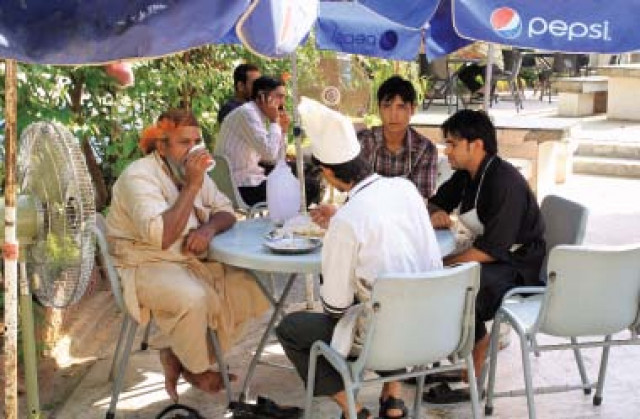Jinnah Super Market: Islamabad’s neglected heart, sweat and soul
A day at Jinnah Super Market.

On the doors of Decent Jewellers in Jinnah Super Market, a sticker reads: “Silver is new gold.” Inside, Bobby Khan, 25, sits behind a glass counter displaying trinkets and silver jewellery.
He’s worked here a year and is now worried. Decent Jeweller’s charge Rs250 per gram of silver; and at this price they expect volume purchasing. “People’s expenses are mounting – electricity, gas bills. They come in and fight over Rs50 and leave when they can’t have it their way,” says Khan. The recent spike in gold prices engendered a trickle effect, affecting both the price of silver and Khan’s particular line of work, forcing him to close the store in a month. “Business is really bad for everyone here right now,” he says.
From the success of swankier commercial venues to market fluctuations, a number of reasons can be attributed to the state of disrepair of Jinnah Super. What remains intact is the place’s authentic charm: This is the old soul of Islamabad that lights up at night from the neon glow coming out of all those closely knit shops; the lights at the food-outlets of Gol Market, a doughnut of jewellers and snack-bars in the middle of the market’s heady activity.
Exclaimed a customer while watching popular eatery Crunchies’ Saminullah working on an anda shami burger, “What? The price of an anda shami is Rs70? It used to be Rs20.” Saminullah, who has been deep-frying at Crunchies for 11 years, said nothing but a cocky staffer interjected: “But they come with fries!”
It may not be gourmet, but they’re still selling. Even the potato chips vendor – who goes by the vaguely offensive moniker, “Afghani Chips” – is impossible to talk to because hungry shoppers keep his hands working.
This is all part of Jinnah’s charm – it offers everything: Food, bargain shopping, gadgets, CDs, jewellery and books to name a few. It’s our very own melting pot – with people from all over Pakistan working hard to stay afloat; each has a story to tell and years of hard work to show.
Meet fifteen-year-old Azad from Quetta, who has grey eyes that glint with curiosity, loves having his picture taken and runs a jewellery shop within the market’s underground labyrinth of basement ventures. Unlike the silver houses, Azad explained business was running smoothly. The low-priced bangles (Rs60 and up), earrings and necklaces from Thailand, India and Afghanistan are “very popular with goras (foreigners)”.
Meanwhile, Jinnah’s ice cream vendor has a bone to pick with the Capital Development Authority (CDA): “The shop-keeper’s union has allowed us to work here but someone from the CDA comes almost every day to say we have to shut down.”
A glimpse of Jinnah’s dark side: Small, movable businesses versus the hand of the CDA; the age-old underage labour issue. These have been around for years.
When it comes to Jinnah’s age, a dating-technique can be applied to any one of the stores to unearth this figure. The abandoned and closed Guys and Dolls clothing outlet – its sign chipped and fading – is a monument from the early 80s, when Jinnah Super really took off. At this time, Blackbeard’s launched here as Islamabad’s first fast food joint, attracting hipsters from all over Rawalpindi. Now its customers are mostly people who work in nearby stores.
Still, there are some who understand Jinnah’s value for pop-culture iconography: Films like Sole Search and the soon-to-be released Gol Chakkar have been inspired by Jinnah based stereotypes of the sort of crowd that hangs out there; the badmashes, the ‘Jinnah Boyz’.
But it’s also so much more than fodder for film-making: This is the primordial sludge where Islamabad life sprang out from; its where to find real people, experiences and stories – the city’s neglected heart, sweat and soul.
Published in The Express Tribune, August 8th, 2011.



















COMMENTS
Comments are moderated and generally will be posted if they are on-topic and not abusive.
For more information, please see our Comments FAQ